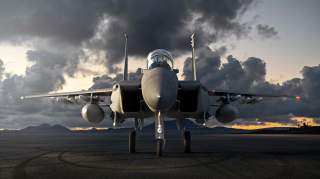Russia's Military Dream: Shooting Down Lots of New F-15EX Fighters
No stealth, no problem?
But non-stealthy F-15s are "unable to survive against the threats of biggest concern in our national-defense strategy." David Deptula, a retired Air Force general and former F-15 pilot who is now the dean of the Mitchell Institute for Aerospace Studies in Virginia, wrote in a Feb. 11, 2019 op-ed for Forbes.
The debate continues over the Pentagon’s proposal to buy new F-15EX Eagle fighters from Boeing to complement Lockheed Martin-made F-35 stealth fighters.
As lawmakers weigh the military’s request, Air Force magazine has published an infographic comparing the two fighters.
Both fighters cost roughly $80 million apiece, according to Air Force. But the similarity ends there. The F-35 is stealthier but the F-15 flies higher, farther and faster and carries more weaponry.
(This first appeared in April 2019.)
A Russian-made S-400 air-defense system could detect an F-35 at 20 miles, Air Force estimated. It could pick up an F-15EX 200 miles away.
While an F-35 can carry 22,000 pounds of munitions to a ceiling of 50,000 feet and a distance of 670 miles at a top speed of Mach 1.6, the F-15EX can haul 29,500 pounds of weapons as high as 60,000 feet and as far as 1,100 miles at a top speed of Mach 2.5.
An F-35 costs $35,000 per hour to operate. An F-15EX costs $27,000 per hour.
The new Eagle’s main advantage, however, is that existing F-15 squadrons quickly and cheaply can convert to the type, Air Force‘s John Tirpak explained.
“The F-15EX, USAF argues, is essentially an in-production aircraft. It has upward of 70-percent parts commonality with the F-15C and E already in USAF service and can use almost all the same ground equipment, hangars, simulators and other support gear as the Eagles now in service,” according to Tirpak.
“At a unit price roughly comparable to that of the F-35, F-15 squadrons could transition to the F-15EX in a matter of weeks, whereas converting pilots, maintainers, facilities and equipment to the F-35 takes many months, the Air Force says.”
The Defense Department compelled the Air Force to request eight F-15EXs as part of the flying branch's 2020 budget request. The eight planes would cost $1.2 billion.
The Air Force reportedly would buy another 136 F-15EXs through the mid-2020s. The new Eagles would replace 1980s-vintage F-15Cs in some or all of the nine squadrons that fly the older type, mostly for patrols over the United States.
The F-15EX boasts better sensors and avionics than the F-15C has and can carry more weapons than the older Eagle can do. Owing to worsening metal fatigue, the old F-15Cs "won't make it to 2030," Air Force major general David Krumm, the service's director of strategic plans and requirements, told Tirpak and fellow Air Force magazine reporter Brian Everstine.
Critics of the F-15EX include some experts as well as lawmakers in districts that heavily depend on Boeing-rival Lockheed. The Air Force for 2020 has asked to purchase 48 stealthy F-35s from Lockheed. That's far short of the 80 to 100 F-35s the Air Force wants to buy every year but says it can’t afford.
Air Force chief of staff Gen. David Goldfein told Defense News that buying F-15EXs would not impact the service's planned acquisition of more than 1,700 F-35s. "They complement each other," Goldfein said. "They each make each other better."
But non-stealthy F-15s are "unable to survive against the threats of biggest concern in our national-defense strategy." David Deptula, a retired Air Force general and former F-15 pilot who is now the dean of the Mitchell Institute for Aerospace Studies in Virginia, wrote in a Feb. 11, 2019 op-ed for Forbes.
“China and Russia are radically advancing their military capabilities that threaten U.S. strategic preeminence,” Deptula added. “There are some in the Department of Defense who are advocating that the Air Force purchase new versions of legacy fighters as a means of achieving cost-efficiency—aircraft that were designed in the 1960s and first started rolling off production lines in the 1970s. Trying to adopt aircraft that belong in museums to warfare in the 21st century is a mistake."
“While the Air Force is adamant that buying F-15EXs will not reduce the requirement to build 1,763 F-35s, history and the Air Force’s own budget request suggests otherwise,” Tirpak noted. “The 2020 budget submission shows the Air Force buying 24 fewer F-35s over the next five years compared to last year’s plan.”
David Axe serves as Defense Editor of the National Interest. He is the author of the graphic novels War Fix, War Is Boring and Machete Squad.
Image: Boeing

